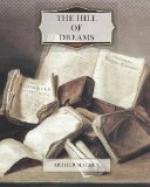The bureau was carried to his room and replaced the “bird’s-eye” table under the gas-jet. As Lucian arranged what papers he had accumulated: the sketches of hopeless experiments, shreds and tatters of stories begun but never completed, outlines of plots, two or three notebooks scribbled through and through with impressions of the abandoned hills, he felt a thrill of exaltation at the prospect of work to be accomplished, of a new world all open before him.
He set out on the adventure with a fury of enthusiasm; his last thought at night when all the maze of streets was empty and silent was of the problem, and his dreams ran on phrases, and when he awoke in the morning he was eager to get back to his desk. He immersed himself in a minute, almost a microscopic analysis of fine literature. It was no longer enough, as in the old days, to feel the charm and incantation of a line or a word; he wished to penetrate the secret, to understand something of the wonderful suggestion, all apart from the sense, that seemed to him the differentia of literature, as distinguished from the long follies of “character-drawing,” “psychological analysis,” and all the stuff that went to make the three-volume novel of commerce.
He found himself curiously strengthened by the change from the hills to the streets. There could be no doubt, he thought, that living a lonely life, interested only in himself and his own thoughts, he had become in a measure inhuman. The form of external things, black depths in woods, pools in lonely places, those still valleys curtained by hills on every side, sounding always with the ripple of their brooks, had become to him an influence like that of a drug, giving a certain peculiar color and outline to his thoughts. And from early boyhood there had been another strange flavor in his life, the dream of the old Roman world, those curious impressions that he had gathered from the white walls of Caermaen, and from the looming bastions of the fort. It was in reality the subconscious fancies of many years that had rebuilt the golden city, and had shown him the vine-trellis and the marbles and the sunlight in the garden of Avallaunius. And the rapture of love had made it all so vivid and warm with life, that even now, when he let his pen drop, the rich noise of the tavern and the chant of the theatre sounded above the murmur of the streets. Looking back, it was as much a part of his life as his schooldays, and the tessellated pavements were as real as the square of faded carpet beneath his feet.
But he felt that he had escaped. He could now survey those splendid and lovely visions from without, as if he read of opium dreams, and he no longer dreaded a weird suggestion that had once beset him, that his very soul was being molded into the hills, and passing into the black mirror of still waterpools. He had taken refuge in the streets, in the harbor of a modern suburb, from the vague, dreaded magic that had charmed his life. Whenever he felt inclined to listen to the old wood-whisper or to the singing of the fauns he bent more earnestly to his work, turning a deaf ear to the incantations.




